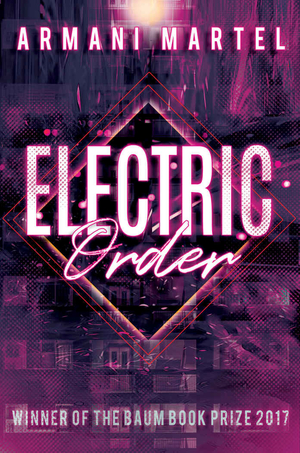
Electric Order, winner of the 2017 Baum Book Prize, holds no punches in its startling and unique vision of the future. The prologue has a razor-sharp hook that will grip you from the very start.
Set in a future not too far away, the story follows two characters – Paulo, a down and out police detective, who’s just about done in by a job that seems to have no end. He’s the compelling lead protagonist as he pursues Daniel, a mysterious villain wanted for a high-status murder. Paulo is the everyman: disgruntled but easy to like, if it were not for him being so lazy.
The world of the book is written with vivid clarity. The reader can almost touch the Metropolis, as Martel is expert at establishing setting. Highly layered with political references and observations, it is easy to see similarities with the world built by Orwell in 1984, as corruption is rife, and technology invades people’s lives. However, the political underlining of the novel is painted with a broader brush than Orwell’s dystopia. Armani Martel has a background in politics, and this can be seen clearly throughout this novel, which has a heavy political bent without seeming heavy-handed. His knowledge bleeds onto the page and sets the foundation for a believable, extraordinary world.
The mixture of languages is also another factor that adds depth to this novel, creating a multicultural world of the future, which seems both prescient and a direct reflection of the current moment. And then there is the intensity of the scenes, especially the beginning, as Martel’s other strong suit is expertly crafting action scenes, which are plentiful throughout. The story immediately drops the reader into the deep end with high-octane action, and doesn’t let up until the end.
At the same time, the novel could have slowed down its pace without affecting the story – and, indeed, enhancing the world and characters. Conflict and action is key to the novel, but a snapshot of the characters’ everyday lives – not just Paulo, but the people around him – would have worked wonders for understanding motivation and the world at large. There is also detail where there doesn’t need to be, making the narrative somewhat uneven. For example, while the mixture of languages is colorful and interesting, at times this detail is added with no real purpose for the story. The dialogue can ramble as well, which in contrast with the zippy prose of the action, stands out. That said, as world-building and action outweigh dialogue, this isn’t an overwhelming issue – but it is the biggest problem with the novel on the whole.
These problems are mitigated by a vivid “Blade Runner”-esque world, and is a must-read for fans of action-heavy dystopian fiction. The strands that deal with the mysterious ‘man’ act as a fine counterbalance to Paulo’s story. Together, they work to paint a dynamic picture, with a story that comes at you fast and unforgiving. All told, Electric Order is an impressive science fiction debut.
Book Links
STAR RATING
Design
Content
Editing
Get an Editorial Review | Get Amazon Sales & Reviews | Get Edited | Get Beta Readers | Enter the SPR Book Awards | Other Marketing Services























Leave A Comment